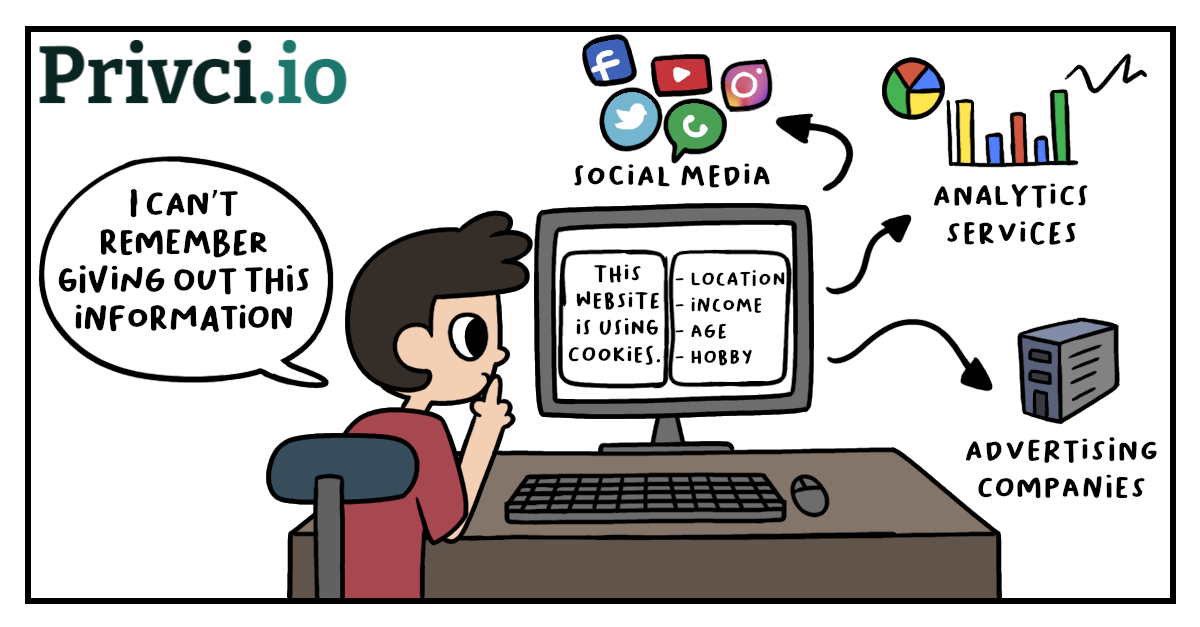Do you know what really happens to the data you share on your social media? Find out the sinister truth and learn how to protect yourself.
How social media sells your information
These days, social networks are a big part of our lives with most people engaging with platforms like Facebook, Twitter and Instagram on a daily basis. While these networks were initially created to bring people closer to friends and family, they’ve progressed into something much more.
They’re now an integral and hugely influential part of our daily lives that have moved beyond connecting people.
We use social media platforms to get current news, find brands we like, follow inspirational individuals and so much more. Ultimately this means big business for organisations. Our personal data becomes somewhat like currency that’s traded to the highest bidder. And with profit comes risk to those unsuspecting individuals who share every aspect of their life on social media.

Your Digital Footprint
Every person leaves a trace as they navigate the internet. Anyone who makes their social media profile(s) public, with information on their age, favourite music/brands etc. will end up leaving a bigger digital footprint. Like most other users, you most likely accepted the terms and conditions of these networks without even reading them. It’s so much easier to just click the “accept” box, than read through pages of complex information.
Maybe you should’ve taken the time to read the terms and conditions to ensure your data privacy.
Most users would be shocked at what they’re agreeing to when it comes to using social media. Platforms like Facebook have the rights to images you upload onto the platform, can sell public profile data to its partners, and so on. Along with seeing personalised ads based on data evaluation, there are greater risks involved.

Cybercrime and Scams
Many don’t understand that their data could end up in the hands of criminals with a lack of information security, and are rarely aware of how far their data actually travels on the net.
When so-called social engineers get hold of your data, the threat to your data privacy becomes real. Social engineers are digital con artists who deceive their victims to get either their data or money. They use social media among other methods to adopt a false identity to gain the trust of their potential victim.
They either present themselves as someone from the authorities (like from a bank or government) or they impersonate friends, relatives or potential love interests. They do this by hacking or using data from social media accounts to contact potential victims.
Data privacy is constantly at risk as the number of cybercrimes and scams rise. Identity theft is on the rise where the perpetrators scam individuals or commit other crimes under your name. Baiting is a kind of social engineering where providers of “free” downloads ask for your account login information. They then use this information to access your e-mail. Phishing attacks feed on a victim’s fear and their trust in the authorities. They base their text and design of emails on those from banks or renowned service providers. They then link to “dummy” websites that look like the real thing. If you enter your personal information like bank details there, the cybercriminals get direct access.
Conclusion: How social media sells your information
Your personal data is your identity so you should protect it at all times, rather than openly share it on social media. The disadvantages of oversharing on social media and having an open profile, as well as not being aware how these platforms use your data, is not only a risk to yourself but your family too. Data privacy security awareness is key.
If you’re concerned about your personal data and you’d like to know what data is being collected, how it’s being stored and if it’s being shared, then Privci is for you. It’s a Google Chrome extension that helps you protect your data when you’re online that’s great for the entire family, especially kids. Find out more here.
If your enjoy reading this article why not share with others!
Divine Chana C. Senior Analyst, Privci.io


